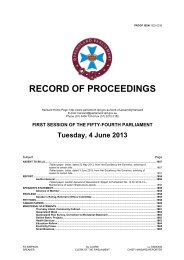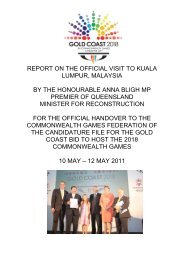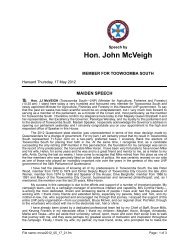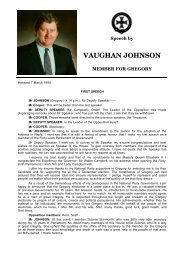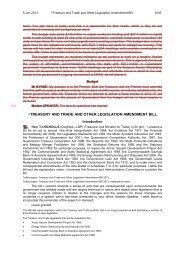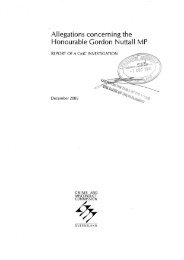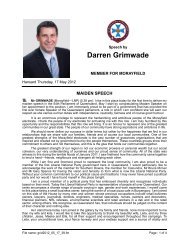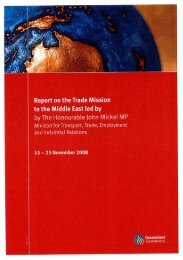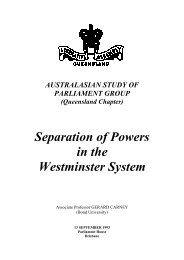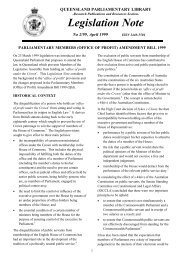weekly hansard - Queensland Parliament - Queensland Government
weekly hansard - Queensland Parliament - Queensland Government
weekly hansard - Queensland Parliament - Queensland Government
Create successful ePaper yourself
Turn your PDF publications into a flip-book with our unique Google optimized e-Paper software.
2632 Child Safety Legislation Amendment Bill 23 Aug 2005<br />
children subject to these agreements will be afforded the same rights and privileges as a child under the<br />
existing child protection order regime.<br />
This proposal also requires that the first option for care to be considered is placing the child with<br />
the extended family if appropriate. I really welcome the proposal that the definition of the extended<br />
family is to be amended to introduce the concept of kin and kinship. While I recognise that this is<br />
important from a cultural perspective with Indigenous groups, I believe that it will also recognise other<br />
social relationships where families often have close relationships with individuals who are not actually<br />
related. I am sure many of us have grown up calling someone uncle and aunty when in reality they are<br />
just good family friends and not relatives at all.<br />
I would like to take the opportunity provided by this legislation to deal with the issue of care by<br />
extended families. The minister is well aware that in many cases relations of the birth parents take<br />
responsibility for the upbringing of children and do so at considerable personal and social cost, not just<br />
financial cost. These arrangements are not just best for the child, as identified in this legislation, but also<br />
save the state an enormous financial burden. It is in this context that I raise with the minister the matter<br />
of carer payments to grandparents or other family members like uncles and aunts.<br />
Mr DEPUTY SPEAKER (Mr Wallace): Order! I remind the member for the Burdekin that that bill is<br />
before the House.<br />
Mrs MENKENS: I would like the minister to comment on clause 28 which amends section 91<br />
dealing with appeals against decisions. The intention of this clause is to exclude from the appeal<br />
mechanism appeals against a decision to remove a child from a carer who is placed under a care<br />
agreement. As the minister has stated, these care agreements are a consequence of an agreement<br />
between the chief executive and the child’s parents. Further, the time frame for placements under care<br />
agreements are limited to an initial 30 days. The explanatory notes then go on to indicate that if the<br />
circumstances leading to the removal of the child result in a cancellation, suspension or amendment of<br />
the approval these are reviewable decisions. I ask the minister to explain what process is used if a child<br />
is to be removed with the parents approval? Is it that if the parents withdraw the approval for the care<br />
order it just becomes null and void and therefore is not appealable?<br />
An essential aspect of this proposal is the introduction of a certificate of approval for carers. This<br />
requires that the department undertake the necessary checks on the antecedents of not only the<br />
proposed career but also other adults who reside in the residence where care is to be approved. It is a<br />
reality that these checks are not just desirable but sadly in today’s society essential. I note that because<br />
of the emergent connotations of these voluntary arrangements there is a provision for provisional<br />
certificates to permit the full process to be undertaken whilst care arrangements are established.<br />
As the minister has mentioned, the CMC report made specific recommendations regarding the<br />
care of Indigenous children who represent almost 25 per cent of children in the child protection system.<br />
Obviously, this overrepresentation of Indigenous children is a symptom of underlying societal<br />
disadvantage, which is a challenge for government at all levels to address. Unfortunately, this legislation<br />
also has the challenge of dealing with the realities uncovered by the CMC foster care inquiry and<br />
accordingly provides for the recognition of recognised Indigenous organisations or individuals so that<br />
Indigenous children can receive culturally sensitive care.<br />
The minister is well aware of previous difficulties that have occurred in the administration of<br />
Aboriginal and Islander child-care agencies, the ACCAs, and the resultant defunding of many of these<br />
groups. While the opposition supports the proposals in relation to the involvement of recognised<br />
Indigenous entities, I must emphasise recommendation 8.5 of the commission which addressed one of<br />
the key failures of the department of families and requires that the Indigenous child placement principle<br />
specifically states that a placement decision can only be made if it is in the best interests of the child.<br />
I have noted the comments by the Minister for Energy and Minister for Aboriginal and Torres Strait<br />
Islander Policy who, because he supported this recommendation that may result, in some cases, in<br />
Indigenous children being placed in the care of white carers, was accused of supporting another stolen<br />
generation. This is just inflammatory radical scaremongering. I support Minister Mickel. I presume and<br />
have no doubt that the minister opposite does as well. All this legislation says is that the safety of the<br />
children must be the primary focus. The attitude expressed by some that any care must be with<br />
Indigenous carers regardless is exactly what caused the circumstances that led to the previous scandal<br />
with foster-carers. I take this opportunity to remind the minister and the department of other provisions in<br />
the principles relating to administration of the act—in particular, that families have the primary<br />
responsibility for the upbringing, for the protection and for the development of their children and that the<br />
preferred way of ensuring a child’s wellbeing is through the support of the child’s family.<br />
As an introduction to my further comments may I also emphasise subsection 5(2)(d), which states<br />
that powers conferred under this act should be exercised in a way that is open, fair and respects the<br />
rights of people affected by their exercise. This bill introduces a provision that will enable the chief<br />
executive or a delegated officer to release confidential information subject to specific child focused<br />
criteria. With the recognition of the kinship arrangements in this legislation, it is obviously appropriate<br />
that they be provided with the necessary information if they are to participate in the decision-making



